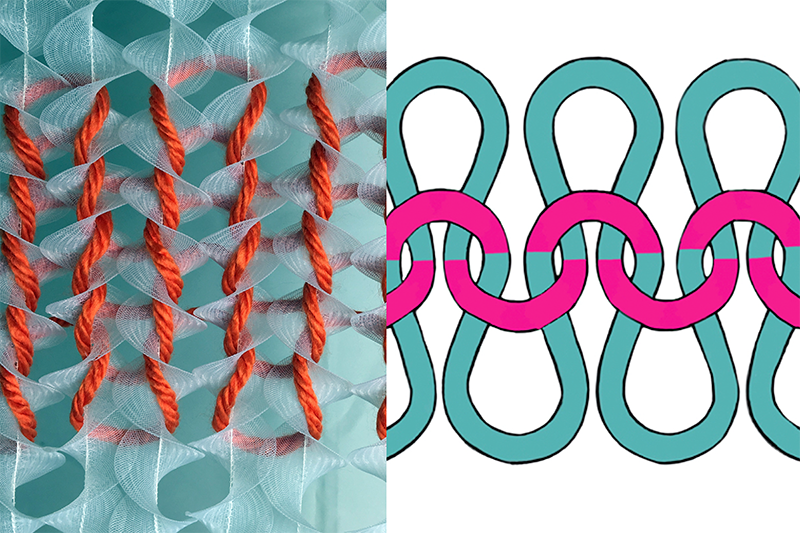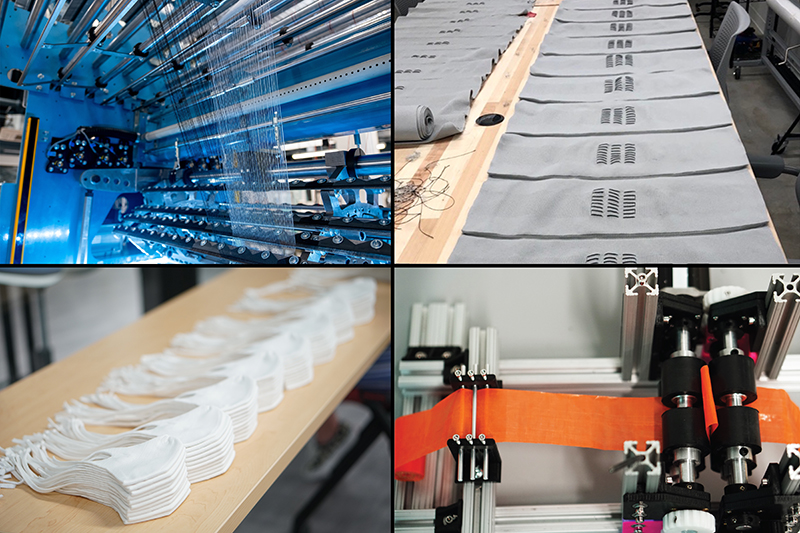Focus Areas
Innovation through textile fabrication involves addressing the
industry’s grand challenges, including the need for new ways to model
and design textiles pre-fabrication, as well as new tools and fabrication
techniques to enable scalability and further automation. Advances in these
fundamental building blocks will enable new ways for advanced manufacturing to
progress in the United States, create a need for new skill sets and expertise,
and enable the incorporation of new functionality into textiles.
Virtual Textile Modeling and the Digital Twin

One of the textile industry’s grand challenges involves the need for new
ways to physically model and design textiles pre-fabrication. Historically
this has been a major challenge due to the complex dynamics inherent in
textile structures. Through a joint effort of CFF and Professor Randall Kamien
of the University of Pennsylvania, with ongoing funding support from the US
Army DEVCOM, new design tools are in development to enable the modeling of
knit structures using a digital twin.
Related: Computational Modeling of Knitted Textile Architectures | Self-Folding in Weft Knit Textiles
Advanced Manufacturing & Automation of Textile Manufacturing
 The Center’s
R&D projects often involve working with new materials that require
modification or adaptation to industrial equipment, or even the development of
new equipment that allows automated manipulation of soft or flexible yarns,
fibers or fabrics. The range of equipment in the Center’s Innovation
Space allows for the simulation of a mini-factory environment. At the
beginning of the Covid-19 pandemic, this capability allowed the Center to
pivot to full-time manufacturing of knitted masks for several months to supply
essential Drexel staff and the broader community.
The Center’s
R&D projects often involve working with new materials that require
modification or adaptation to industrial equipment, or even the development of
new equipment that allows automated manipulation of soft or flexible yarns,
fibers or fabrics. The range of equipment in the Center’s Innovation
Space allows for the simulation of a mini-factory environment. At the
beginning of the Covid-19 pandemic, this capability allowed the Center to
pivot to full-time manufacturing of knitted masks for several months to supply
essential Drexel staff and the broader community.
Related: Masks | Exo-Skin Soft Haptic Exoskeletal Interface
E-Textile Design, Fabrication & Integration
 R&D Projects at
the Center frequently involve using conductive textiles to create active and
responsive devices. Using a wide array of conductive yarns and fibers with a
range of electrical properties and suitability for textile integration, the
Center’s work continues to explore the potential of fabrics that can
transduce input and transmit electrical signals. This includes work on the
knitted capacitive touch sensor developed by the Center, as well as
development of frameworks for signal processing and design kits for soft
systems.
R&D Projects at
the Center frequently involve using conductive textiles to create active and
responsive devices. Using a wide array of conductive yarns and fibers with a
range of electrical properties and suitability for textile integration, the
Center’s work continues to explore the potential of fabrics that can
transduce input and transmit electrical signals. This includes work on the
knitted capacitive touch sensor developed by the Center, as well as
development of frameworks for signal processing and design kits for soft
systems.
Related: Capacitive Touch Sensor | Textile Energy Storage | Smart Fabric
Bellyband | Smart Fabric Sensors and Actuators | Touch Sensitive for Hubo | Wi-fi
Power Harvesting | MXene Yarn